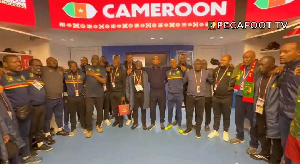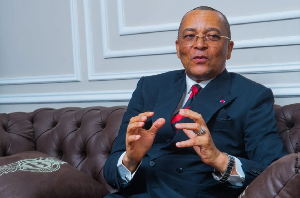Expanding the Scope of Tackling Cameroon's urban and rural crime Highlights: Worsening urban and rural crime in Cameroon is placing increasing demands on the State's police departments.
Cameroon police forces are woefully underresourced, inadequately trained, unaccountable, and distrusted by local communities, leaving them ineffective in addressing these security challenges such as kidnapping.
Nonstate or community-based policing groups often enjoy local support and knowledge, accessibility, and effectiveness. Accordingly, collaborative state-nonstate policing partnerships represent an underrecognized vehicle for substantially expanding security coverage in Cameroon's urban and rural areas.
The Threat of Urban and Rural Crime in Cameroon Violent crime in Cameroon cities, towns and villages is endemic and in many of the regions worsening with the emergence of Boko Haram in the North of the country, the Cameroonian police force is recording consistently rising rates of murder and attempted murder on a daily basis.
Rates of armed robbery particular in the Littoral Region and South West are also rising at catastrophic rapidity. Whatever the accuracy of crime statistics in Cameroon, the perception of growing danger has generated widespread anxiety.
It can rightly be argued today that 80 percent of inhabitants of Cameroon are fearful of being victims of crime such as arm robbery. Anecdotal accounts among citizens of Cameroon's rural and city dwellers indicate that urban and rural crime rates have increased in the last decade, contributing to pervasive fears that impede trading, fray social capital, and undermine normal rural and urban activity. To be sure, violent crime is a daily threat for every Cameroonian. Such high crime rates have a series of contributing factor.
To a large extent they are not surprising given Cameroon's internal political crisis that emanated from the docile leadership to the current Boko Haram Islamic terror group coupled with poverty. Cameroon is therefore, suffering the social and economic consequences of conflicts in other neighboring states such as Nigeria and Central African Republic.
The conflicts have produced violent political cultures and have traumatized, divided and continues to impoverish the people of Cameroon. Above all, the conflicts have fostered the availability of firearms in the major towns and cities in the country. The growing threats to economic development and stability posed by these internally focused security challenges underscore the expanding importance of Cameroon's policing establishments.
In Cameroon, available resources have regularly been tilted heavily toward the military over the police. This preference for the military by the current Biya government has weakened the police force who lack management and technical skills, interagency coordination, communication equipment, transport and even lighting, office space, filing cabinets, stationery, computers, uniforms and forensic labs-all undermining effectiveness. Compounding these challenges is a long history of police neglect, corruption and impunity in Cameroon.
Consequently, Cameroon has the onerous task of jettison the argument that the police force is significantly brutal, corrupt, inefficient, unresponsive and unaccountable to the generality of the population. To be sure, the current Prime Minister and Head of Government has introduced new police restructuring, training and oversight bodies but with limited success.
Correspondingly, few citizens expect a rapid transformation of policing and police forces. Rather many continue to doubt the CPDM governments' ability and willingness to finance the necessary steps that promise police availability, accountability, integrity, effectiveness and community partnership.
Their skepticism is reinforced by the activities of Boko Haram in the North of the country, the famous Limbe bank robbery and daily media accounts of police abuse and collaboration with criminal gangs and citizens daily encounters paying bribes to police to allow them through traffic check points or to investigate crimes.
This experience has driven many citizens to look elsewhere for protection. In short, official police protection is insufficient to address the growing violence in many localities in Cameroon. Even local Cameroon police bosses recognize the need to supplement their weakly performing personnel.
Policing by Communities While policing in Cameroon cities are almost invariably weak and underresourced, citizens are not without policing services. In fact, such services are widely available to the majority-but they are provided by non state actors.
In Cameroon, it is not always appreciated that nonstate actors are so numerous and diverse that they are the dominant police providers, often enjoying local ownership, cultural relevance, accessibility, sustainability and effectiveness. The nonstate sector is so diverse that generalizations, whether dismissive or laudatory, are not useful.
Cameroon numerous policing providers include customary leaders, religious organizations, ethnic associations, youth groups, street associations, work-based associations, community police forums, neighborhood organizations, local and international security companies and local entrepreneurs.
Contrary to popular opinion, not all are militants or vigilantes prone to violence and abuse. Indeed, they are often the preferred police in most localities in cosmopolitan areas like Douala.
A survey of four Cameroonian Regions found 4 nonstate policing organizations dealing with crime, which were citizens' preferred choice. Nonstate police are for the most part within walking distance, speak local languages and do not use formal legal terminology or procedure. A response is more or less guaranteed, thus making them more familiar and accessible.
Required payments are usually relatively small. With their local knowledge, they commonly resolve neighbor disputes, restrain antisocial behavior, protect homes at night, and return stolen goods more consistently and effectively than official police. And they are culturally relevant in that they are policing the local prevailing norms about what is a crime and how it should be addressed so as to restore community harmony.
In Cameroon, they exist not just because the state police are ineffective in enforcing order, but because the police are often perceived as enforcing an alien, inappropriate, or erroneous order. Undoubtedly, some of the criticisms of local nonstate actors are valid. Some are indeed prone to human rights abuses and may be unreliable, have poor skills and lack both transparency and vertical accountability.
Yet most are not violent autonomous groups but frequently civic-minded,concerned citizens who regularly collaborate with Cameroon policing institutions.Such links are often welcome on the part of the local police commissioners because they are unable to fulfill all of their responsibilities without local assistance.
For nonstate actors, despite their awareness of the failings of the police, links with the police offer legitimacy and access to resources. They may also help ensure the police are more efficient and accountable. Typically collaboration involves sharing intelligence, equipment, training and operational responsibilities.
Across the Republic of Cameroon, large variety of actors provide policing, many in informal(and sometimes formal) partnerships with local police. Police bosses who participate in such collaboration recognize that nonstate actors present opportunities to enhance police effectiveness and institutional reputation.
Furthermore, it is vital to state that in the case of commercial security, they guard the principal economic assets of towns-banks, hotels, factories etc A program for tackling Cameroon's urban crime Programs for addressing urban crime in Cameroon must take into account two facts: One, the state police are too weak to undertake the task of crime prevention and investigation by themselves.
Two, there are in fact many nonstate actors who currently provide the majority of everyday policing in major towns and cities in Cameroon. To establish a state police service sufficiently large and equipped to serve all citizens would take years and would be beyond the budgetary allocation of this present Biya administration to achieve or to sustain.
Conversely, supporting nonstate actors already on the ground and who meet certain standards is much less costly and likely to be more sustainable. What is needed, then is a coordinated program of targeted assistance for community-based and commercial nonstate policing in addition to the support given to state policing.
Such a program would not need to start from scratch with unfamiliar actors but could draw on existing though often overlooked successful local partnership that contribute tangible results and efficiencies. By facilitating such partnerships, international donors can also help address concerns of poor and marginalized communities.
Partnerships also prevent nonstate actors and the Cameroonian police from being totally autonomous and acting with impunity. Through semiformal partnerships, nonstate actors more often integrate and conform to generally accepted policing standards. State-nonstate policing partnership also boost efficiency and performance. Some might fear that support to nonstate actors will divert Cameroon's precious resources away from formal policing.
However, most nonstate actors require fairly minimal support. They do not use expensive buildings, computers, and vehicles or pay high salaries. A small investment in nonstate actors produces benefits for state police in terms of increased personnel on the ground and enhanced intelligence.
Moreover, this can be done alongside state police capacity building initiatives.As such, it constitutes no significant threat to police productivity.
On the contrary, partnership permits a division of labor where the police can concentrate on their most essential functions and make use of their special skills, authority and expertise while nonstate actors can undertake their own low-level and everyday policing needs(with backup support from state police in cases where they cannot cope)
Actualités of Thursday, 18 September 2014
Source: cameroon-concord.com













